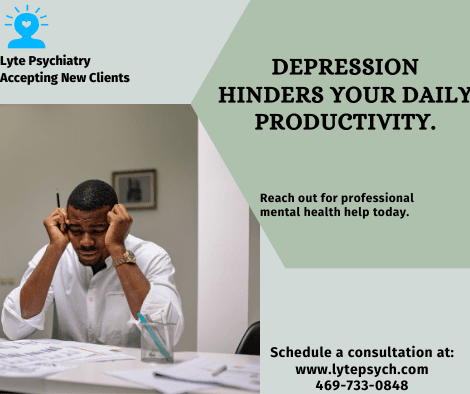Tue Oct 01 2024
5 Ways Depression Affects Productivity and Work Performance Advice from Lyte Psychiatry (Best Adults and Adolescents Therapist and Psychiatrist Near You) Affordable Therapist and Psychiatrist Near You, Dallas, TX

5 Ways Depression Affects Productivity and Work Performance – Advice from Lyte Psychiatry (Best Adults and Adolescents Therapist and Psychiatrist Near You)
Depression is a mental health condition that not only affects emotional well-being but also has a profound impact on productivity and work performance. For many individuals, depression can make it difficult to manage day-to-day tasks, stay focused, and maintain motivation in the workplace.
At Lyte Psychiatry in Dallas, TX, we specialize in helping both adults and adolescents manage depression effectively, allowing them to improve their quality of life and productivity. Here are five ways depression can affect work performance and strategies for managing these challenges.
1. Difficulty Concentrating and Staying Focused
One of the hallmark symptoms of depression is difficulty concentrating. Many individuals with depression find it hard to focus on tasks, leading to decreased efficiency and increased mistakes. This lack of focus can make it challenging to complete work on time or stay engaged during meetings.
How to Manage:
Break tasks into smaller, manageable steps.
Use time management tools, such as timers or task lists, to stay organized.
Practice mindfulness or grounding techniques to help refocus your attention when your mind starts to wander.
2. Decreased Motivation and Energy Levels
How to Manage:
Prioritize tasks based on importance and deadlines.
Set small, achievable goals to create a sense of accomplishment and boost motivation.
Engage in short breaks or physical activity to increase energy levels throughout the day.
3. Increased Absenteeism or Presenteeism
How to Manage:
Consider flexible work options, such as remote work or adjusted hours, if possible.
Communicate with a trusted supervisor or HR department about your needs and seek accommodations that can support your mental health.
Focus on self-care outside of work, such as proper sleep, nutrition, and relaxation techniques, to improve overall functioning.
4. Negative Thinking Patterns
How to Manage:
Practice cognitive-behavioral techniques (CBT) to challenge negative thoughts and reframe them into more positive, realistic perspectives.
Celebrate small successes and remind yourself of past accomplishments to build confidence.
Seek professional help if negative thinking persists, as therapy can provide tools to manage these thought patterns.
5. Difficulty Interacting with Colleagues
How to Manage:
Set small, realistic goals for social interactions, such as attending a team meeting or responding to emails promptly.
Practice active listening and open communication to improve interactions with colleagues.
If necessary, discuss your mental health challenges with a trusted coworker or supervisor to ensure they understand your situation and provide support.
Seek Professional Help at Lyte Psychiatry (Best Adults and Adolescents Therapist
Depression can significantly affect productivity and work performance, but with the right strategies and support, individuals can manage their symptoms and improve their functioning in the workplace. At Lyte Psychiatry in Dallas, TX, our team of experienced therapists and psychiatrists is here to provide personalized, affordable care tailored to your needs. If you or someone you know is struggling with depression, reach out to us for guidance and effective treatment options.
To Schedule an appointment. Click Here
To see our services. Click Here
Call us if you have questions at 469-733-0848
FAQ
Q: How can I talk to my employer about depression?
A: Be honest and direct but focus on how your mental health affects your work performance. Consider discussing possible accommodations or flexible work options that could help you manage your symptoms.
Q: Is therapy helpful for managing depression at work?
A: Yes, therapy can provide coping strategies and tools to help individuals manage depression both in and outside of the workplace. Cognitive-behavioral therapy (CBT) is particularly effective for addressing negative thinking patterns.
Q: Can medication help improve work performance if I have depression? A: Medication can be helpful for managing symptoms of depression, such as fatigue, lack of concentration, or low mood. A psychiatrist can evaluate your needs and recommend appropriate treatment options.
Q: How can I maintain productivity when I feel overwhelmed?
A: Break tasks into smaller steps, prioritize what’s most important, and take regular breaks to prevent burnout. Seeking professional help can also provide you with tailored strategies to manage stress and overwhelm.
Q: What should I do if my depression worsens and affects my work?
A: If your depression worsens, it’s important to seek immediate professional help. Contact a therapist, psychiatrist, or crisis support to address your symptoms and prevent further impact on your work and personal life.